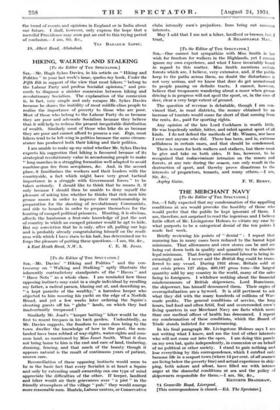[To the Editor of THE SPECTATOR.] SIR,—Mr. Davies' " Hiking
and Politics " and the con- troversy on " Walking and Stalking " aptly illustrate the inherently contradictory standpoints of the " Haves " and " Have Nots " as a whole class. I am reminded how these opposing instincts may exist in a single individual by recalling my father, a radical parson, blazing out at, and describing as, " a kept parasite of the wealthy," a harmless keeper who objected to him mooring his yacht on the edge of a Norfolk Broad, and yet a few weeks later ordering the Squire's shooting guests off his " glebe " lands, on which they had inadvertently trespassed !
Similarly Mr. Joad's "keeper baiting" hiker would be the first to resent trespass in his back garden. Undoubtedly, as Mr. Davies suggests, the freedom to roam does bring to the town dweller the knowledge of how in the past, the non- landed have been robbed of way-rights, water-rights and com- mon land, as mentioned by Miss Janet Smith. What it does not bring home to him is the cost and care of land, timbering, draining, fencing, and that much of the beauty though it appears natural is the result of continuous years of patient, unseen care.
Reconciliation of these opposing instincts would seem to lie in the basic fact that every Socialist is at heart a Squire and only by extending small ownership can one type of mind appreciate the difficulties of the other. If keeper, landlord and hiker would air their grievances over " a pint " in the friendly atmosphere of the village " pub." they would emerge more reasonable men. Hostels, Labour centres, or Conservative clubs intensify men's prejudices. Inns bring out common interests.
May I add that I am not a hiker, landlord or brewer, but, I


































 Previous page
Previous page